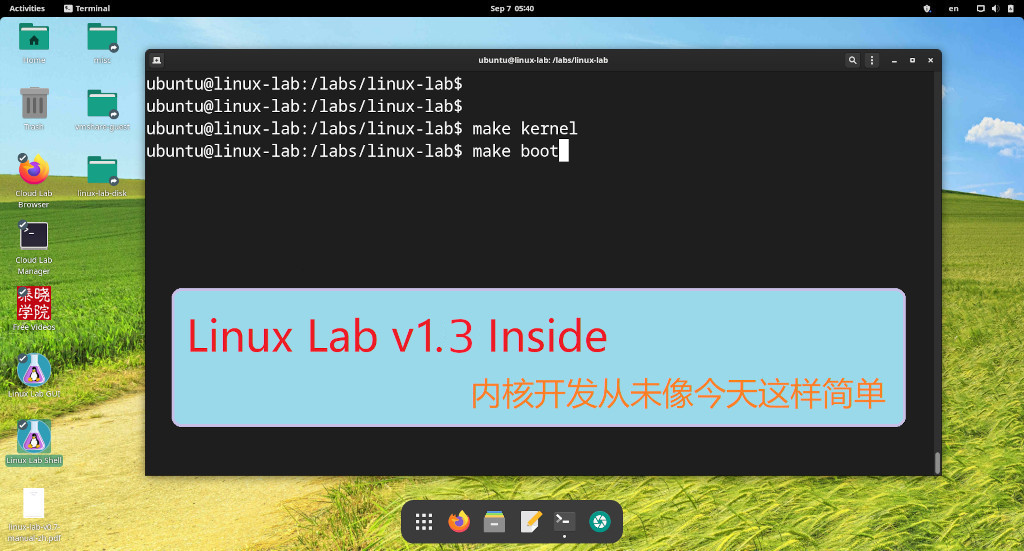[置顶] 泰晓 RISC-V 实验箱,配套 30+ 讲嵌入式 Linux 系统开发公开课
Tinyget 架构简介
总体结构
TinyGet 目录结构如下:
.
├── README.md
├── setup.py
└── tinyget
├── common_utils.py
├── globals.py
├── __init__.py
├── interact
│ ├── ai_helper.py
│ ├── buffer.py
│ ├── __init__.py
│ └── process.py
├── main.py
├── package.py
└── wrappers
├── _apt.py
├── deprecated
│ ├── _apt.py
│ └── _dnf.py
├── _dnf.py
├── __init__.py
├── _pacman.py
└── pkg_manager.py
Tinyget 的整体结构如下:

interact 包
interact 包主要用于处理交互,process.py 用于处理与底层的交互,ai_helper.py 用于处理与 OpenAI 服务器的交互。ai_helper 在本系列其他文章中已经有介绍,在此不再赘述,重点介绍一下 process.py。
def spawn(args: Union[List[str], str], envp: dict = {}):
"""
Spawns a new process with the given arguments and environment variables.
Args:
args (Union[List[str], str]): If args is a string, assume it is a shell command.
If args is a list, assume it is a list of arguments.
envp (dict, optional): A dictionary containing additional environment variables
to be passed to the spawned process. Defaults to {}.
Returns:
subprocess.Popen: A subprocess.Popen object representing the spawned process.
"""
# If args is a string, assume it is a shell command
# If args is a list, assume it is a list of arguments
orig_envp = dict(os.environ)
for k, v in envp.items():
orig_envp[k] = v
return subprocess.Popen(
args=args,
stdout=subprocess.PIPE,
stderr=subprocess.PIPE,
stdin=subprocess.PIPE,
close_fds=True,
env=orig_envp,
bufsize=0,
shell=isinstance(args, str),
)
def execute_command(args: Union[List[str], str], envp: dict = {}, timeout: int = None):
"""
Execute a command and capture its stdout and stderr.
Args:
args (Union[List[str], str]): The command to be executed. It can be a list of arguments or a single string.
envp (dict, optional): The environment variables to be passed to the command. Defaults to an empty dictionary.
timeout (int, optional): The maximum number of seconds to wait for the command to complete. Defaults to None.
Returns:
Tuple[str, str]: A tuple containing the stdout and stderr of the executed command.
Raises:
CommandExecutionError: If the command execution fails, an exception is raised with details about the command, environment variables, stdout, and stderr.
"""
p = spawn(args, envp)
stdout, stderr = p.communicate(input=None, timeout=timeout)
if p.returncode != 0:
raise CommandExecutionError(
message=f"Executing command failed {args} with {envp}",
args=args,
envp=envp,
stdout=stdout.decode(),
stderr=stderr.decode(),
)
return stdout.decode(), stderr.decode()
本项目希望能够像调用函数一样执行命令,因此专门为 subprocess 制作了一层封装,最终达到 execute_command 并返回 stdout、stderr 的结果。
为了保证稳定捕获异常,execute_command 专门检查了命令行的返回值,如果返回值不为 0(根据 Linux 中的一般性约定,非零返回值即为错误发生),则抛出异常:
class CommandExecutionError(Exception):
def __init__(self, message: str, args: list, envp: dict, stdout: str, stderr: str):
"""
Initializes a new instance of the class.
Parameters:
message (str): The error message.
args (list): The arguments passed to the function.
envp (dict): The environment variables.
stdout (str): The standard output.
stderr (str): The standard error.
Returns:
None
"""
super().__init__(message)
print(message)
self.args = args
self.envp = envp
self.stdout = stdout
self.stderr = stderr
wrappers 包
此包为 TinyGet 核心包,为三类包管理器的功能进行了适配。
TinyGet 动态地检测当前支持的包管理器:
def get_os_package_manager(possible_package_manager_names: List[str]):
"""
Returns the first supported package manager found in the system's PATH environment variable.
Parameters:
possible_package_manager_names (List[str]): A list of possible package manager names to search for.
Returns:
str: The name of the first supported package manager found in the system's PATH environment variable.
Raises:
Exception: If no supported package manager is found in the system's PATH environment variable.
"""
paths = os.environ["PATH"].split(os.pathsep)
for bin_path in paths:
for package_manager_name in possible_package_manager_names:
if package_manager_name in os.listdir(bin_path):
return package_manager_name
raise Exception("No supported package manager found in PATH")
并依据检测的结果动态绑定包管理器:
from ..common_utils import get_os_package_manager
package_manager_name = get_os_package_manager(["apt", "dnf", "pacman"])
if package_manager_name == "apt":
from ._apt import APT as PackageManager
elif package_manager_name == "dnf":
from ._dnf import DNF as PackageManager
elif package_manager_name == "pacman":
from ._pacman import PACMAN as PackageManager
else:
raise NotImplementedError(f"Unsupported package manager: {package_manager_name}")
其中 APT, DNF, PACMAN 均继承自 PackageManager 类:
class PackageManagerBase:
def list(self) -> List[Package]:
raise NotImplementedError
def update(self):
raise NotImplementedError
def install(self, package: Package):
raise NotImplementedError
def uninstall(self, package: Package):
raise NotImplementedError
def upgrade(self):
raise NotImplementedError
def search(self, keyword, limit=10) -> List[Package]:
raise NotImplementedError
def get_package(self, package_name: str) -> Package:
raise NotImplementedError
顶层接口
main.py 中实现了与用户交互的所有功能,以 click.command 的形式暴露给用户,以 tinyget list 为例,实现如下:
@cli.command("list", help="List packages.")
@click.option(
"--installed",
"-I",
is_flag=True,
default=False,
help="Show only installed packages.",
)
@click.option(
"--upgradable",
"-U",
is_flag=True,
default=False,
help="Show only upgradable packages.",
)
@click.option(
"--count", "-C", is_flag=True, default=False, help="Show count of packages."
)
def list_packages(installed: bool, upgradable: bool, count: bool):
package_manager = PackageManager()
packages = package_manager.list_packages(
only_installed=installed, only_upgradable=upgradable
)
if count:
click.echo(f"{len(packages)} packages in total.")
else:
for package in packages:
click.echo(package)
使用 click 库实现 CLI,为后续 trogon 实现 TUI 提供了便利。
猜你喜欢:
- 我要投稿:发表原创技术文章,收获福利、挚友与行业影响力
- 知识星球:独家 Linux 实战经验与技巧,订阅「Linux知识星球」
- 视频频道:泰晓学院,B 站,发布各类 Linux 视频课
- 开源小店:欢迎光临泰晓科技自营店,购物支持泰晓原创
- 技术交流:Linux 用户技术交流微信群,联系微信号:tinylab
| 支付宝打赏 ¥9.68元 | 微信打赏 ¥9.68元 | |
 |  请作者喝杯咖啡吧 |  |


